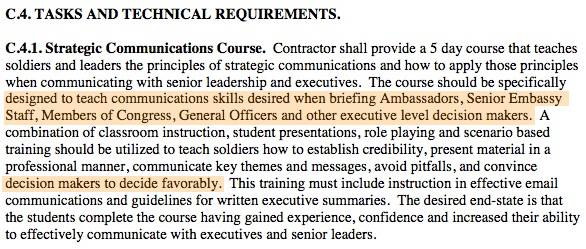 Michael Hastings, the Rolling Stone reporter who famously exposed the boorishness of Gen. Stanley McChrystal, recently published another controversial piece. This time, he reported on a psychological operations soldier’s likely illegal orders to “manipulate visiting American senators into providing more troops and funding for the war.”
Michael Hastings, the Rolling Stone reporter who famously exposed the boorishness of Gen. Stanley McChrystal, recently published another controversial piece. This time, he reported on a psychological operations soldier’s likely illegal orders to “manipulate visiting American senators into providing more troops and funding for the war.”
Hastings was criticized for sensationalizing the story. That’s a typical fallback complaint when a reporter speaks plainly about something which the people involved with would rather obscure. Hastings’ haters also sidestepped legitimate concerns about the military’s attempts to tilt the political process toward courses of action favored by some—but certainly not all—of its leadership.
Fact is, the Rolling Stone piece had an important point to make. And here’s another example of military propaganda directed toward a domestic audience. Instead of a PSYOPS team, however, this one involves private contractors.
Last month the US Special Operations Command issued a call for “strategic communications” instructors. As the contract specs show, the purpose of this program is to train a class of 72 Army officers to better persuade elected officials—in effect, to turn soldiers into lobbyists, so that some generals and their future employers in the defense industry can get what they want.

Here again are the important bits:
The [strategic communications] course should be specifically designed to teach communications skills when briefing Ambassadors, Senior Embassy Staff, Members of Congress, General Officers and other executive level decision makers.
[The training should] teach soldiers how to establish credibility…communicate key themes and messages…and convince decision makers to decide favorably.
On the face of it, there’s nothing wrong with training officers to “effectively communicate.” But that is a euphemism. The language of the contract itself is also a form of “strategic communications,” designed to cloud over the actual activities it describes: lobbying. (Is there a shorter word that describes attempts to persuade elected officials?)
I’ll be genuinely shocked if, at some point in the future, it turns out the that the graduates of these courses have used their “strategic communications” training to advocate for military de-escalation and smaller defense budgets. As Hastings correctly noted, the military’s lobbying objectives are typically twofold: “more troops and more funding.” No big deal—just war and peace, is all.
Who knows? If Gen. MacArthur had only had some better advice about “strategic communications,” he might’ve won that little argument with Truman.
Ridiculous PowerPoing chart via CB3 Communications.